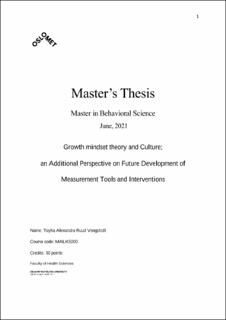| dc.contributor.advisor | Ree, Gunnar | |
| dc.contributor.author | Vengsholt, Toyha | |
| dc.date.accessioned | 2021-10-06T08:10:40Z | |
| dc.date.available | 2021-10-06T08:10:40Z | |
| dc.date.issued | 2021 | |
| dc.identifier.uri | https://hdl.handle.net/11250/2787986 | |
| dc.description.abstract | The growth mindset framework has attained the status of a prominent motivational theory, assuming a causal relationship between mindsets and performance levels. The level and type of mindset are established using questionnaires. The present thesis analyzes early studies of growth mindset with the systematic use of variables that are manipulable - if only in principle. The observational basis of questionnaires is interpreted to be the participants’ verbal descriptions of current contingencies and individual learning history. Then, growth mindset culture is analyzed in terms of behavioral contingencies and cultural selection. Using data collected by a consulting firm, a relationship between growth mindset culture and a target Key Performance Indicator (KPI) is examined. The respondents to the Growth Mindset Index (GMI) were employees (N= 162) in thirteen stores under the same chain. A Pearson’s correlation coefficient was computed to assess a relationship between growth mindset culture and KPI. To assess the statistical connection between factors in the GMI and KPI, five additional linear regression analysis was computed. The results indicate non-significant correlations between GMI and KPI and singular factors and KPI. The validity and reliability of the GMI and Growth mindset theory are discussed. Verbal descriptions can provide insight into current contingencies in an organization. The suggestion is that measurement tools should include factors able to evoke rule-governed behavior in organizational contingencies that is consistent with specific goals. The use of functional analysis before the implementation of interventions may enable later demonstration of control. | en_US |
| dc.language.iso | eng | en_US |
| dc.publisher | OsloMet - storbyuniversitetet | en_US |
| dc.relation.ispartofseries | MALKS;2021 | |
| dc.subject | Growth mindset theory | en_US |
| dc.subject | Behavioral contingencies | en_US |
| dc.subject | Measurement tools | en_US |
| dc.subject | Interventions | en_US |
| dc.title | Growth mindset theory and culture: An additional perspective on future development of measurement tools and interventions | en_US |
| dc.type | Master thesis | en_US |
| dc.description.version | publishedVersion | en_US |
